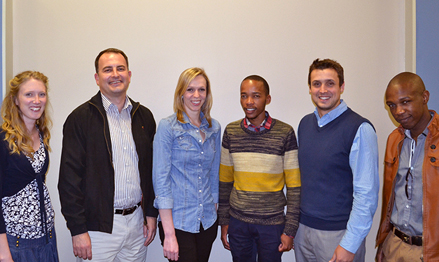Latest News Archive
Please select Category, Year, and then Month to display items
11 January 2021
|
Story André Damons
|
Photo Supplied
 Dr Ralph Clark
Dr Ralph Clark
The Afromontane Research Unit (ARU), the flagship research group of the University of the Free State (UFS) Qwaqwa Campus, has recently been granted R8,4 million to establish a Risk and Vulnerability Science Centre programme.
The Risk and Vulnerability Science Centre (RVSC) programme was established by the Department of Science and Innovation (DSI) as part of the Global Change Research Plan for South Africa and is funded by the DSI through the National Research Foundation (NRF). The RVSC will focus on the need to generate and disseminate knowledge about risk and vulnerability on global change challenges faced by local policy makers/ governance structures and communities in South Africa.
Invited to participate
Dr Ralph Clark, Director of the ARU, says the UFS, together with the University of Zululand and the Sol Plaatje University, has been invited to participate in Phase 2 of the RVSC programme. Dr Clark was approached by the DSI (on referral from the South African Environmental Observation Network – SAEON) in February 2020 regarding the potential for establishing a RVSC at the UFS Qwaqwa campus.
Subsequent interactions were held between the UFS and DSI, and in March 2020, the UFS formally accepted the DSI invitation. It has since been agreed that the RVSC: UFS will be hosted as a RVSC under the ARU umbrella, with dedicated personnel embedded at the UFS in this regard (internal processes and reporting) but reporting directly to the NRF regarding the RVSC.
Interest and support welcomed
Dr Clark welcomed this interest and support from the DSI-NRF, saying that the funds will further assist the UFS in growing its excellent and growing research portfolio and building more research capacity on this traditionally undergraduate-focused campus. “The RVSC will contribute to much-needed solutions in an area marked by major sustainability challenges and will assist in moving Phuthaditjhaba away from its negative apartheid history towards becoming a sustainable African mountain city,” says Dr Clark.
UFS gets support for improving university access and success in South Africa
2013-10-24
|
 |
|
Members of the SASSE Research team are from left: Carike Jordaan, Dr Francois Strydom, Lana Swart, Seisho Gaboutlwelweboutlwelwakemo, Michael Henn en Katleho Nyaile.
Photo: Supplied
24 October 2013 |
The university’s Centre of Teaching and Learning (CTL) received a grant for US$820 000 (about R8 million) from the Kresge Foundation for their South African Survey of Student Engagement (SASSE) research team.
The SASSE research team is committed to furthering student access with success by promoting quality teaching and learning institutionally and promoting collective impact around student success nationally.
Through this three-year project, the SASSE team aims to provide a range of deeply contextualised and globally benchmarked student engagement measures that can be used at institutional and module/course level for the South African context. The data from these measures can be used to improve the quality of undergraduate teaching and learning, and participating institutions will have access to appropriate capacity development interventions to empower them to use the data to promote evidence-based change in their institutions.
Dr Francois Strydom, Academic Director at the CTL, says the lessons from this higher-education project could be used to develop a stronger post-school sector which could help the country to deal with the massive challenge of youth unemployment; thereby promoting equity, social justice and a prosperous democracy in South Africa.
The Kresge Foundation is a private philanthropic foundation in the United States, which is focused on creating opportunity for low-income people through various programmes. This three-year project forms part of the Kresge Foundation’s Education Programme, which focuses on promoting access and success at South African universities. Therefore the SASSE project aims to contribute to the Kresge-sponsored Access and Success in Higher Education in South Africa (ASHESA), to promote a national conversation on improving student success.
In January this year, the university was one of four South African universities selected to take part in a multi-million rand programme to bolster private fund-raising and advancement efforts. For this programme the UFS was granted US$640 000 (about R5,6 million) over a period of five years.